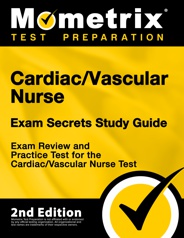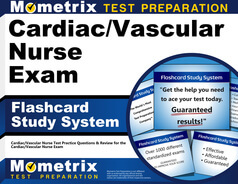The Cardiac-Vascular Nursing Certification (CV-BC) is a credential awarded by the American Nurses Credentialing Center (ANCC) to registered nurses who pass the Cardiac-Vascular Nursing Certification exam, demonstrating the necessary skills and competencies for entry-level positions.
Click “Start Test” above to take a free Cardiac-Vascular Nursing practice test!
Exam Eligibility
To be eligible for the exam, you must meet all of the following requirements:
- You must have a current RN license
- You must have at least 2 years of full-time RN experience
- You must have at least 2,000 hours of cardiac-vascular nursing clinical practice within the last 3 years
- You must have completed at least 30 hours of cardiac-vascular continuing education within the last 3 years
Cardiac-Vascular Nursing Certification Exam Outline
The Cardiac -Vascular Nursing Certification exam contains 150 multiple-choice questions, 25 of which are unscored, and you will be given a time limit of three hours.
The exam is split into four content categories, and each category contains some number of knowledge questions and skill questions.
I. Assessment and Diagnosis (27 questions)
The questions in this category assess your knowledge of anatomy, physiology, and pathophysiology. You will also be tested on the following skills:
- Cardiac-vascular assessment tools and techniques
- Nursing diagnosis identification and prioritization
- Patient interviews
- Data collection and interpretation
II. Planning and Implementation (44 questions)
The questions in this category assess your intervention and care-coordination skills. You will also be tested on your knowledge of the following:
- Legal and ethical considerations
- Surgeries
- Procedures
- Risk-reduction measures
- Scope and standards of practice
- Pharmacologic therapies
- Non-pharmacologic therapies
- Complementary therapies
III. Evaluation and Modification (23 questions)
The questions in this category assess your knowledge of drug interactions and expected outcomes. You will also be tested on the following skills:
- Recognition and treatment of adverse reactions
- Recognition and treatment of urgent conditions
- Recognition and treatment of emergent conditions
IV. Patient and Community Education (31 questions)
The questions in this category assess your home-monitoring, health-promotion, and IEP-implementation skills. You will also be tested on your knowledge of the following:
- Chronic disease management
- Community resources
- Cardiac-vascular risk factors
- Cardiac-vascular education topics
- Community resources
Check Out Mometrix's Cardiac/Vascular Nurse Study Guide
Get practice questions, video tutorials, and detailed study lessons
Get Your Study Guide
Registration
To register for the exam, you must submit an application via the ANCC website. Your application should include all of the necessary proof-of-eligibility documentation and the examination fee. The examination fee differs depending on your membership status:
| Membership | Exam Fee |
|---|---|
| ANA member | $295 |
| SVN member | $340 |
| PCNA member | |
| Non-member | $395 |
Once your application is approved, you will receive a confirmation email containing your Authorization to Test (ATT) and information about scheduling your examination appointment.

Cardiac-Vascular Online Prep Course
If you want to be fully prepared, Mometrix offers an online Cardiac-Vascular prep course designed to give you everything you need to succeed!
Here’s what you’ll find in the Cardiac-Vascular course:
- 60+ Review Lessons Covering Every Topic
- 450 Cardiac-Vascular Practice Questions
- 550+ Digital Flashcards
- Money-back Guarantee
- Mobile Access
Everyone learns differently, so we’ve tailored the Cardiac-Vascular online prep course to ensure every learner has what they need to prepare for the Cardiac-Vascular exam.
Click below to check it out!
Test Day
On the day of the exam, you should arrive at the testing center 15-30 minutes before the exam is scheduled to begin. When you arrive, you will be asked to provide two forms of identification, one of which must be a government-issued photo ID.
Personal items such as cell phones, coats, wallets, food/drink, and notes are not allowed in the testing area, so you will be asked to leave them in a secured locker before the exam begins.
Once the check-in process is complete, you will be led to your testing station and given a short tutorial on the testing system before beginning your exam.
How the Exam is Scored
The exam is scored using a criterion-based scoring system. This means that a panel of subject-matter experts has evaluated the questions and determined a passing score. The passing score is set using the modified-Angoff method, which means that your score is based solely upon your performance, and no other test-taker’s scores are taken into account.
Your score is reported on a scale of 1 to 500, with 350 being the minimum passing score.
You will be able to see your preliminary scores as soon as you complete the exam. You will have to sign into your AANC account to view your final score report.
Check Out Mometrix's Cardiac/Vascular Nurse Flashcards
Get complex subjects broken down into easily understandable concepts
Get Your Flashcards
FAQs
Q
How many questions are on the Cardiac-Vascular Nursing exam?
A
There are 150 multiple-choice questions on the exam.
Q
How long is the Cardiac-Vascular Nursing exam?
A
The time limit for the exam is 3 hours.
Q
What is the passing score for the Cardiac-Vascular Nursing exam?
A
To pass the exam, you must achieve a minimum scaled score of 350.
Q
How much does the Cardiac-Vascular Nursing exam cost?
A
The examination fee differs depending on your membership status.


